lin老师 希腊神话(神谱)第一课课件20130104 Greek Mythology-Theogony I
- 格式:pptx
- 大小:168.24 KB
- 文档页数:12
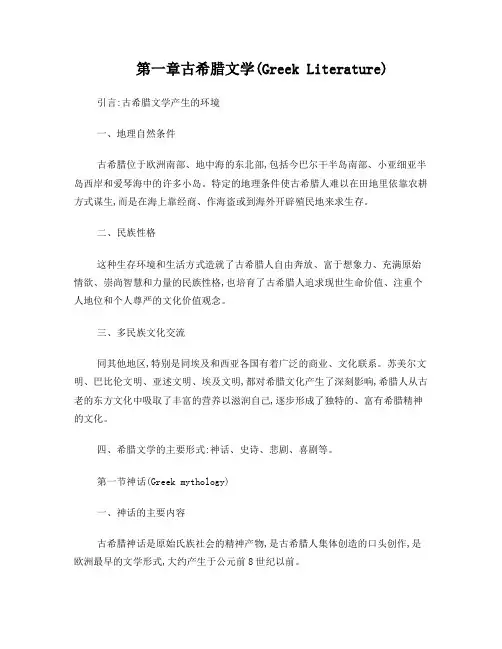
第一章古希腊文学(Greek Literature)引言:古希腊文学产生的环境一、地理自然条件古希腊位于欧洲南部、地中海的东北部,包括今巴尔干半岛南部、小亚细亚半岛西岸和爱琴海中的许多小岛。
特定的地理条件使古希腊人难以在田地里依靠农耕方式谋生,而是在海上靠经商、作海盗或到海外开辟殖民地来求生存。
二、民族性格这种生存环境和生活方式造就了古希腊人自由奔放、富于想象力、充满原始情欲、崇尚智慧和力量的民族性格,也培育了古希腊人追求现世生命价值、注重个人地位和个人尊严的文化价值观念。
三、多民族文化交流同其他地区,特别是同埃及和西亚各国有着广泛的商业、文化联系。
苏美尔文明、巴比伦文明、亚述文明、埃及文明,都对希腊文化产生了深刻影响,希腊人从古老的东方文化中吸取了丰富的营养以滋润自己,逐步形成了独特的、富有希腊精神的文化。
四、希腊文学的主要形式:神话、史诗、悲剧、喜剧等。
第一节神话(Greek mythology)一、神话的主要内容古希腊神话是原始氏族社会的精神产物,是古希腊人集体创造的口头创作,是欧洲最早的文学形式,大约产生于公元前8世纪以前。
希腊神话主要包括神的故事和英雄传说两部分。
神的故事主要包括关于开天辟地、神的产生、神的谱系、天上的改朝换代、人类的起源和神的日常活动的故事。
1、神的谱系及神界的改朝换代2、人的诞生普罗米修斯(Prometheus)按神的模样用泥土造人火的来源潘多拉(Pandora)盒子普罗米修斯受难人类所经历的四个时代:第一个时代是黄金时代,第二个时代是白银时代,第三个时代是青铜时代,随后是黑铁时代。
3、关于季节变化的神话珀耳赛福涅得墨忒耳4、英雄传说。
英雄传说是对于远古的历史、社会生活和人与自然作斗争等事件的回忆。
英雄被当作神和人所生的后代。
英雄传说以不同的家族为中心形成了许多系统,主要有赫拉克勒斯(Hephaestus)的12件大功,忒修斯(Theseus)为民除害,伊阿宋(Jason)取金羊毛(Golden Fleece)和特洛伊(Troy)战争等系统。
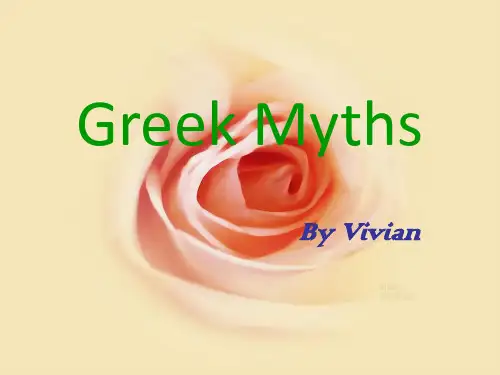

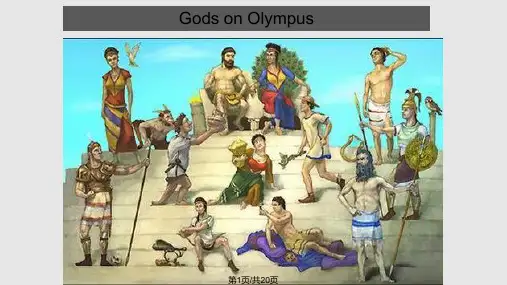

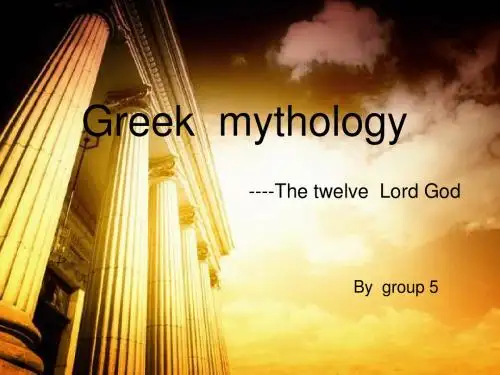
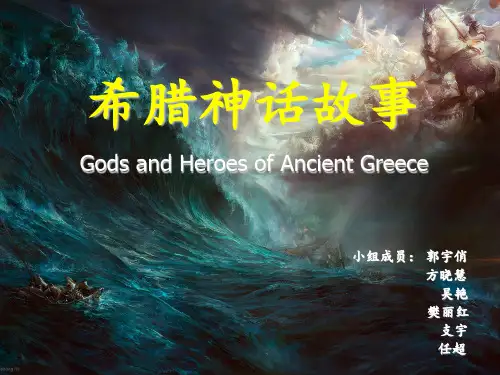
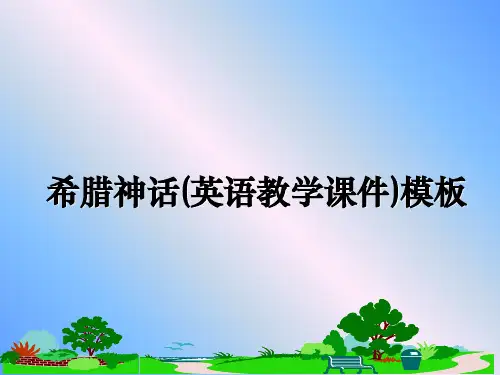
![1[1].2_希腊神话课件](https://uimg.taocdn.com/a4e76f333968011ca30091d2.webp)
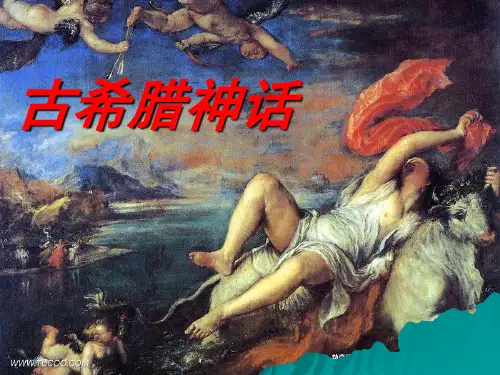
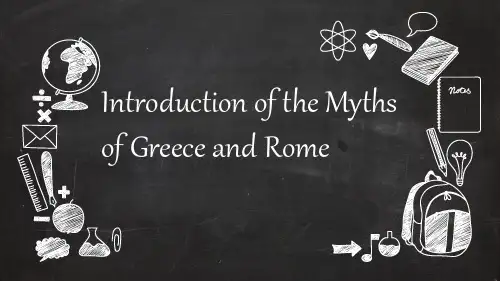
希腊神话第一课GreekMythologyTheogony–PartI神谱大耳朵特色授课室ID:2831时间:2014年1月5日 8:30——10:30授课老师:Lin老师授课内容:特色英语助教:婉音本课内容:希腊神话第一课Greek MythologyTheogony – Part I 神谱I.Introduction - theogonyThe Theogony (Greek: Θεογον?α, Theogonía, pronounced [t?eoɡonía], “the birth of the gods") is a poem by Hesiod (8th –7th century BC) describing the origins and genealogies of Greek polytheism, composed circa 700 BC. It is written in the Epic dialect of Homeric Greek.The versionTranslated by H.G. Eveyln-White in 1914Ⅱ. Table of contentsProemium: Hymn to the Muses of Helicon (1 - 104)Chaos and The First Gods (105 - 122)The Second Generation: Children of the First GodsChildren of NightChildren of GaiaThe Children of Night (part 2)The Line of PontosChildren of Pontos produced asexuallyChildren of Gaia and Pontos (237 - 239)Children of the Titans (337 - )Challenges to ZeusChildren of the Olympians (886 - )Goddesses who bore Children to Mortal Men (965 - 1020) Mortal Women who bore Children to Gods (1021 ff.: the Catalog of Women)Ⅲ. Part I – chaos and the first godsChaos: "Chasm" (116)Gaia or Gaea: "Earth" (116)Tartaros or Tartarus: “Abyss” (119)Eros: "Love" (120)Erebos or Erebus: "Gloom" (123)Nyx: "Night" (123)Ⅳ. ll. 116-138Verily at the first Chaos came to be, but next wide-bosomed Earth, the ever-sure foundations of all (4) the deathless ones who hold the peaks of snowy Olympus, and dim Tartarus in the depth of the wide-pathed Earth, and Eros (Love), fairest among the deathless gods, who unnerves the limbs and overcomes the mind and wise counsels of all gods and all men within them.From Chaos came forth Erebus and black Night; but of Night were born Aether (5) and Day, whom she conceived and bare from union in love with Erebus.(4) Earth, in the cosmology of Hesiod, is a disk surrounded by the river Oceanusand floating upon a waste of waters. It is called the foundation of all (thequalification …the deathless ones...? etc. is an interpolati on), because not only trees,men, and animals, but even the hills and seas (ll. 129, 131) are supported by it.(5) Aether is the bright, untainted upper atmosphere, as distinguished from Aer,the lower atmosphere of the earth.Ⅴ. ll. 116-138 – cont.And Earth first bare starry Heaven, equal to herself, to cover her on every side, and to be an ever-sure abiding-place for the blessed gods. And she brought forth long Hills, graceful haunts of the goddess-Nymphs who dwell amongst the glens of the hills. She bare also the fruitless deep with his raging swell, Pontus, without sweet union of love. But afterwards she lay with Heaven and bare deep-swirling Oceanus, Coeus and Crius and Hyperion and Iapetus, Theia and Rhea, Themis and Mnemosyne and gold-crowned Phoebe and lovely Tethys. After them was born Cronos the wily, youngest and most terrible of her children, and he hated his lusty sire.Ⅵ. ll. 139-146And again, she bare the Cyclopes, overbearing in spirit, Brontes, and Steropes and stubborn-hearted Arges (6), who gave Zeus the thunder and made the thunderbolt: in all else they were like the gods, but one eye only was set in themidst of their fore-heads. And they were surnamed Cyclopes (Orb-eyed) because one orbed eye was set in their foreheads. Strength and might and craft were in their works.(6) Brontes is the Thunderer; Steropes, the Lightener; and Arges, the Vivid One Ⅶ.ll. 147-163And again, three other sons were born of Earth and Heaven, great and doughty beyond telling, Cottus and Briareos and Gyes, presumptuous children. From their shoulders sprang an hundred arms, not to be approached, and each had fifty heads upon his shoulders on their strong limbs, and irresistible was the stubborn strength that was in their great forms. For of all the children that were born of Earth and Heaven, these were the most terrible, andthey were hated by their own father from the first.Ⅷ. ll. 147-163 – cont.And he used to hide them all away in a secret place of Earth so soon as each was born, and would not suffer them to come up into the light: and Heaven rejoiced in his evil doing. But vast Earth groaned within, being straitened, and she made the element of grey flint and shaped a great sickle, and told her plan to her dear sons. And she spoke, cheering them, while she was vexed in her dear heart:Ⅸ.Ll. 164-175(ll. 164-166) `My children, gotten of a sinful father, if you will obey me, we should punish the vile outrage of your father; for he first thought of doing shameful things.'(ll. 167-169) So she said; but fear seized them all, and none of them uttered a word. But great Cronos the wily took courage and answered his dear mother:(ll. 170-172) `Mother, I will undertake to do this deed, for I reverence not our father of evil name, for he first thought of doing shameful things.'(ll. 173-175) So he said: and vast Earth rejoiced greatly in spirit, and set and hid him in an ambush, and put in his hands a jagged sickle, and revealed to him the whole plot.Ⅹ. ll. 176-206And Heaven came, bringing on night and longing for love, and he lay about Earth spreading himself full upon her (7).Then the son from his ambush stretched forth his left hand and in his right took the great long sickle with jagged teeth, and swiftly lopped off his ownfather's members and cast them away to fall behind him. And not vainly did they fall from his hand; for all the bloody dropsthat gushed forth Earth received, and as the seasons moved round she bare the strong Erinyes and the great Giants with gleaming armour, holding long spears in their hands and the Nymphs whom they call Meliae (8) all over the boundless earth.(7) The myth accounts for the separation of Heaven and Earth. In Egyptiancosmology Nut (the Sky) is thrust and held apart from her brother Geb (the Earth)by their father Shu, who corresponds to the Greek Atlas.(8) Nymphs of the ash-trees, as Dryads are nymphs of the oak-trees. Cp. noteon "Works and Days", l. 145.Ⅺ. ll. 176-206 – cont.And so soon as he had cut off the members with flint and cast them from the land into the surging sea, they were swept away over the main a long time: anda white foam spread around them from the immortal flesh, and in it there grewa maiden. First she drew near holy Cythera, and from there, afterwards, shecame to sea-girt Cyprus, and came forth an awful and lovely goddess, and grass grew up about her beneath her shapely feet. Her gods and men call Aphrodite, and the foam-born goddess and rich-crowned Cytherea, because she grew amid the foam, and Cytherea because she reached Cythera, and Cyprogenes because she was born in billowy Cyprus, and Philommedes (9) because sprang from the members. And with her went Eros, and comely Desire followed her at her birth at the first and as she went into the assembly of the gods. This honour she has from the beginning, and this is the portion allotted to her amongstmen and undying gods, -- the whisperings of maidens and smiles and deceits with sweet delight and love and graciousness.(9) `Member-loving': the title is perhaps only a perversion of the regularPHILOMEIDES (laughter-loving).The end~。